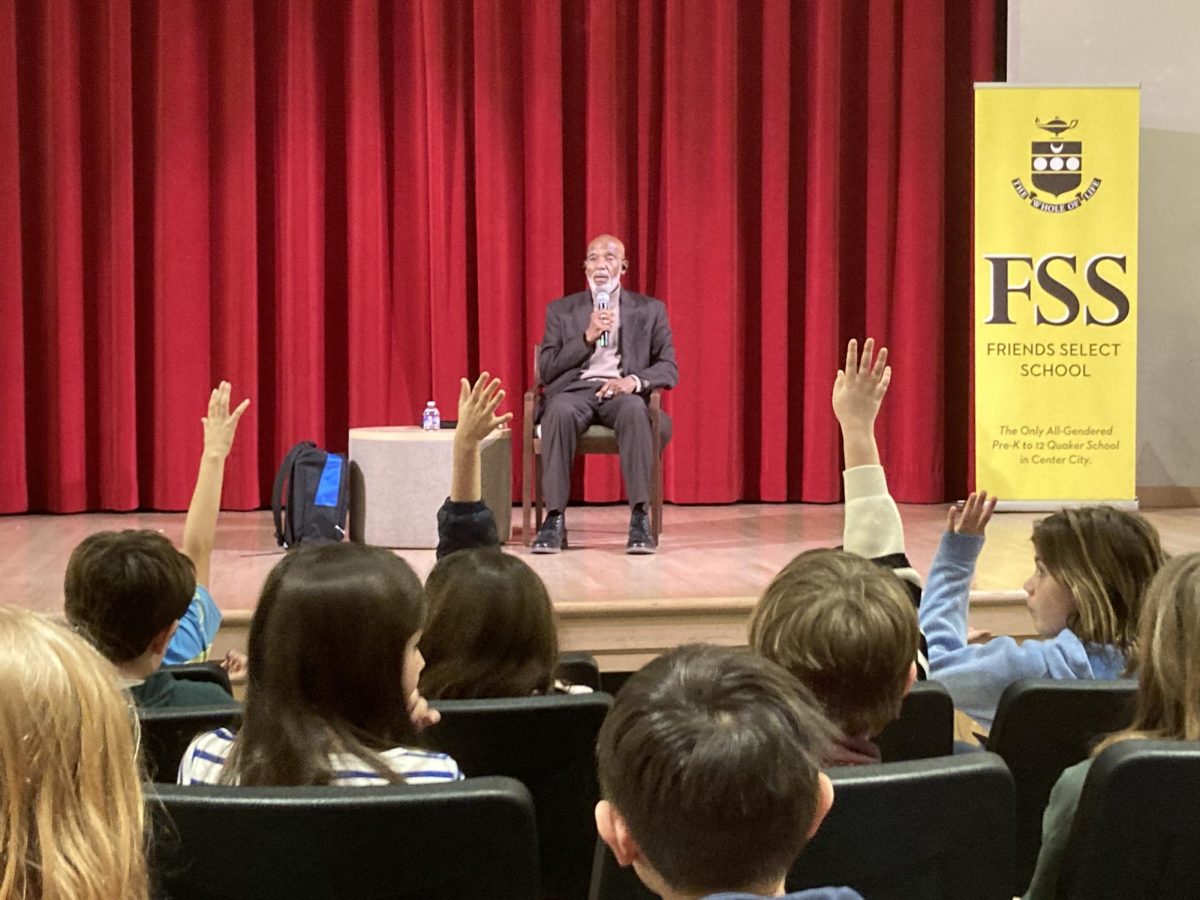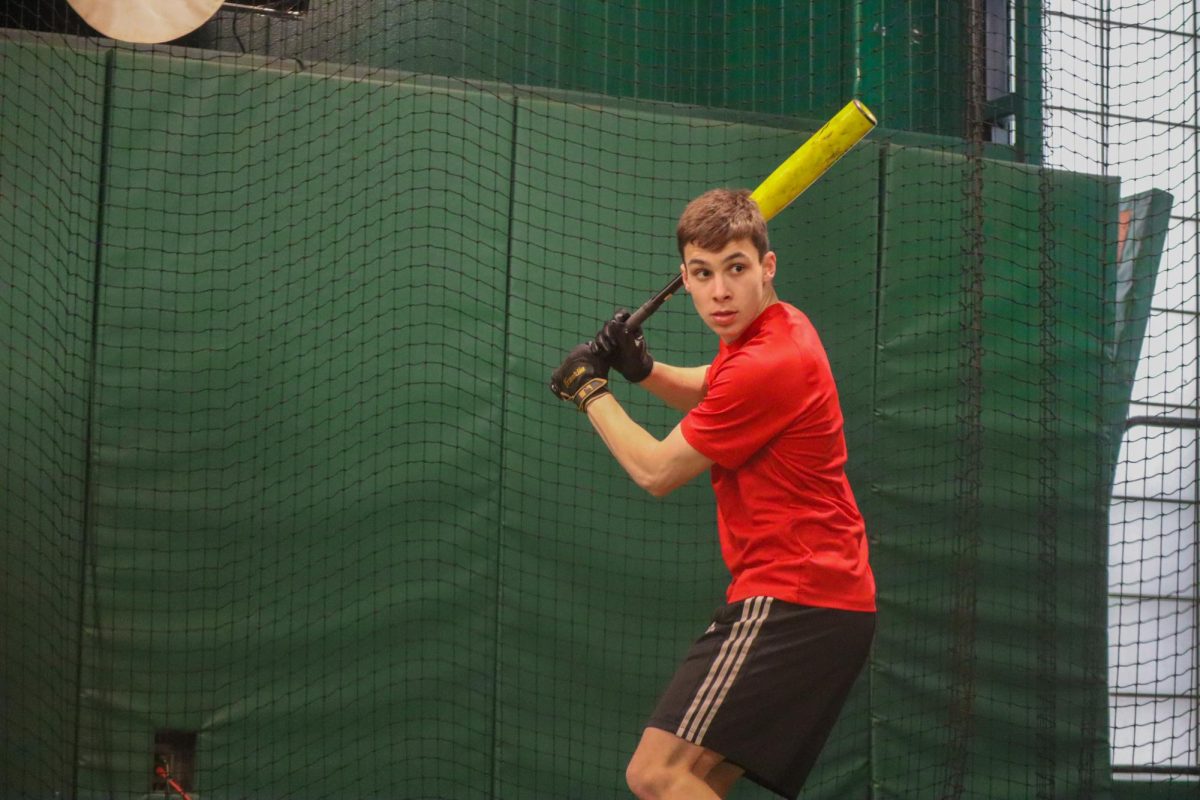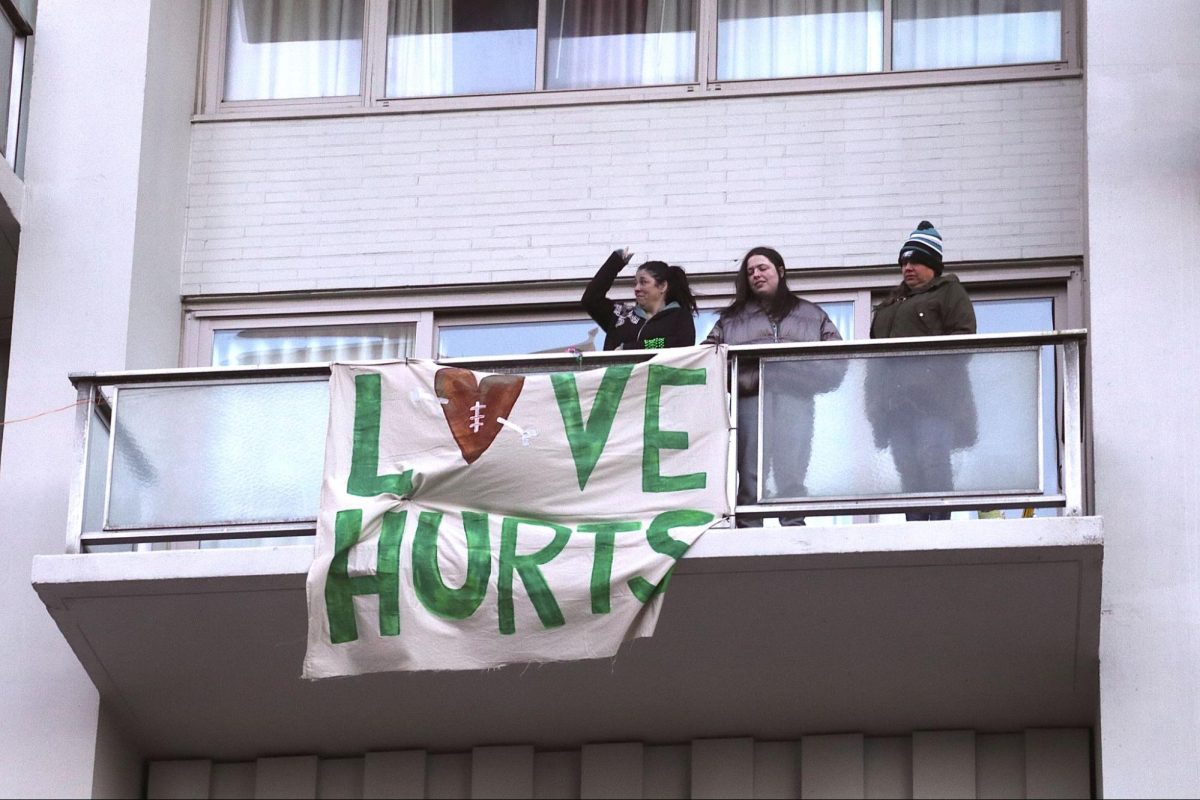The Musicians of Friends Select: Inside and Outside the Classroom
Music bleeds into all parts of the community, brings people together, and gives students ways to express themselves and their emotions. Friends Select provides musical programming beginning in Pre-K. By the time students reach upper school, they have the option to pick between ensemble or choir. Ensemble is then split up into three subdivisions: chamber music, percussion ensemble, and lab band. Furthermore, many seek outside programming in local orchestras and lessons. Because collaborative music-making opportunities are few and far between this year, both students and teachers are getting creative and finding ways to continue pursuing their work and sharing it with the community.
Upper School Ensemble Director Heather Fortune describes the orchestra as a “mixed level, mixed instrument” group that plays a large variety of music genres. She usually arranges the music herself because of the non-traditional composition and lineup of the group, which is the upper school’s largest class. “I really like the large group format because the large group music-making is a special aural experience, and it also allows everyone to play a role of substance,” she says. Heather hopes that each student “pushes themselves beyond what comes easily and strives to improve on their instrument.”
Learning these traits involves critical listening, building perceptive abilities, focusing, having patience, and collaborating. “Also, I hope that my students learn that most any task is doable with a consistent, step-by-step process, with the knowledge that progress is not linear,” she adds. Heather loves when students “surprise themselves” with their musical achievements.
Nathan Wadley, the Upper School Choir Director for the past two years, describes the group as a “community of students who love to sing together. It is a non-auditioned group with a variety of musical backgrounds.” Nathan strives to help students increase their listening and musical literacy skills. “However, I believe that people who have strong interpersonal relationships sing together with more depth and artistry, so community-building is also a high priority in choir,” he adds.
Nathan makes an effort to keep the range of music in class broad: “choir has recently sung music in Latin from the 1500s, a South African freedom song (in Zulu), a Pentatonix arrangement complete with body percussion, and a David Bowie medley for ‘World Cafe Live!’ with the FSS instrumental ensembles.”
Heather has changed the programming of her class over the course of virtual and hybrid learning. Some of these changes have included frequent small-group music-making, music composition courses (specifically for the wind instruments who are not able to play indoors), online music theory tools, and creative projects. “I think we will retain some of these new tools and projects moving forward, frankly, because they have expanded the scope of what we do in ensemble,” she says.
In choir, Nathan has to consider the dangers of singing near others, which is considered a high-risk activity due to aerosol particles. Over Zoom, the class loses “the ability to hear each other, which is actually more important than the sound we create,” says Nathan. During hybrid learning, the in-person singers sat separated from one another while humming, and they used the roof to rehearse on weather-permitting days. Both choir and orchestra produced a performance video for the Gratitude Assembly this past Thanksgiving. The 2021 Winter Concert consists of orchestra and choir videos published in the January 21st newsletter.
Many Friends Select students have practiced and performed their music from home during the first semester, both inside and outside of school, and reflected on their experiences. Campbell Lee ‘23, Charlie Chen ‘23, Madeline Squires ‘22, Chris Crisden ‘22, Nadia Sumner ‘22, Alessandra Yang ‘22, Bella Robinson ‘22, Tony Lian ‘21, C. C. Servon ‘21, Sierra Wei ‘21 all play a litany of instruments and have taken sundry paths to their current proficiency.
Campbell Lee
Campbell started playing piano at a very young age, but eventually switched to the guitar because “a lot of music [he listens] to has guitar in it.” Currently, he plays for the FSS orchestra and lab band. Campbell also finds particular joy in playing music in a group and values its collaborative aspect. His favorite piece, he notes, is the Sarajevo holiday song that the orchestra plays annually; “it’s a really fun piece to play, and last year we had a smoke machine which made it even better,” he says.
Charlie Chen
Charlie found musical inspiration from his older brother, Richard; “I would always hear [him] playing piano at his lessons or practicing at home… I realized it was something I also loved,” he says. He plays both piano and trumpet, which he chose because “[he] loved the way the trumpet sounded, as well as the fact that [he] could play both classical and jazz music on it.” Charlie plays trumpet for the FSS orchestra, chamber ensemble, the Delaware County Youth Orchestra, private lessons, and the Art for Charity concert. “My favorite part about playing music is the feeling of every musician in the room falling into the same groove and feeling the music together. I love the energy everyone radiates and takes in when playing and feeling the music,” he says.
Madeline Squires
Madeline has been a musician for nearly all her life. She started singing around age two and, in kindergarten, began playing the violin, her main instrument. She now plays violin for the FSS instrumental ensemble. She has also taught herself how to play the ukulele and guitar by herself in her free time. Madeline sings and plays guitar on her youtube channel ‘coversbymadeline,’ which she began at the beginning of quarantine. This has been her favorite musical project because it’s a “creative outlet” for her and a “way to bring joy to people during these times of uncertainty.” Her favorite part of playing music is the opportunity it grants to “take [her] mind off of stressful things and allow [herself] to be present in the moment.”
Chris Crisden
Chris has been told by his family and former teachers that he used to “love to put on a show and entertain,” which remains true to this day. “I distinctly remember my music teacher at Greene Street chose me to have a solo in the song Under Pressure because of the way I sang the verses,” he says. Chris has played instruments over the years including drums and guitar, but now focuses on singing. He sings for the upper school choir, takes musical theater classes, participates in out-of-school performances, and plans to participate in the upcoming spring musician Ranked. He also founded and currently leads the FSS Glee Club with Madeline Squires. Chris uses platforms like TikTok and Instagram to showcase his entertainment, including singing and “funny, enjoyable content” available to the public. “When I sing, I feel like almost the singer themself. For example, if I’m singing Man in the Mirror, I would hear MJ sing it and take bits and pieces of what I like and put a Chris spin on it,” he says, adding that singing is a helpful form of self-expression. “If you hear someone singing in the hallways, it’s most likely me,” Chris explains.
Nadia Sumner ‘22
Nadia has “always loved music,” which was always present in her house and childhood. “When my dad was younger, [his family] had a band and played music at his church. At all the family parties and get-togethers, music was always there, so music is very much involved in my history and my life now,” she adds. Nadia chose her instruments as a third-grader — she began with the violin, viola, and cello. “When I first tried the viola, I fell in love with the sound. I thought it was so different and beautiful,” she explains. Nadia plays with the upper school ensemble, and is “grateful to be a part of it.” Nadia’s favorite part of music-making is the process — “I always enjoy working out a part and learning how to play it.” Although she loves to watch a piece come to fruition, she appreciates seeing the satisfying finished product and the “hard work put in… to make something so amazing.”
Alessandra Yang
Alessandra found her musical path from her family, which contains multiple professional musicians. Her beginning in music, she says, was “expected.” She initially started with the violin at age four, and seven years later, switched to the viola, which ended up being a “great fit.” Alessandra began a program called Juilliard Pre-College during her freshman year, which requires consistent weekend trips to New York City, where she takes “chorus, orchestra, lessons, ear training, theory, chamber music, and studio class.” She plays in solo, chamber, and full orchestra settings, and in non-COVID times, would perform in a concert each trimester. Alessandra’s favorite part about playing music is the community it generates; “playing with others in some kind of ensemble is always more fun for me. I love rehearsing and discussing the pieces that we’re playing.” Recently, she has formed a string quartet with some friends, and has gotten the “opportunity to work so detailedly on a piece with the same people for an extended period of time.”
Bella Robinson
Bella began their musical career at age three. “My teacher came to my preschool class and showed us a bunch of different instruments and I fell in love with the violin,” they say. Bella has since expanded their musical repertoire to include ukulele, guitar, piano, and singing. “I am really grateful I have a classical background, and I think it has made it easier to learn other instruments,” they say. Bella plays music in school, free time, and guest appearances in outside of school orchestras. Their favorite part of music is the ability to “express emotions,” as it is a “fun and very relaxing” activity that allows people to connect with one another. Bella identifies their favorite musical experience as an eighth grade school quartet: “The music wasn’t necessarily the best, but I had so much fun, and it was the first time I had really enjoyed playing music in a group.” They also recently started a nonprofit with some friends to “promote musical education in Philadelphia,” which resulted in a recent holiday video concert. Bella was asked to help with the “organizational component of making a music video,” which was shared with some local senior homes.
Tony Lian
For the last thirteen years, Tony has found joy from the piano and now plays for the upper school orchestra and chamber ensemble. He found the piano from a friend’s mother who was a music teacher, and he was “just really attracted to this giant instrument with these 88 black and white keys. [He] had always wanted to play loud sounds just to annoy other kids.” Tony’s favorite musical piece is Rachmaninoff Piano Concerto No. 2, finding it particularly challenging due to length and depth. The piece tells how Rachmaninoff “recovered from clinical depression and writer’s block.” Tony believes that music can be a language to “communicate with others emotionally and spiritually. It is one of the things that truly transcends the boundaries of race, gender, and nationality.” He looks forward to playing with a university symphony orchestra at his future college.
C.C. Servon
C.C. has “always been an avid listener of music;” it has run in her family for years. “[Her dad] and his brothers grew up essentially running wild in ‘70s NYC, and they were always introducing [her] to new stuff… taking me to shows, giving me their old instruments, etc,” she says. C.C. recalls that as a baby, she would “stand next to the family CD player and scream a word I’d made up — ‘McItch’ — at the top of my lungs until somebody would put on some music.” C.C. began playing drums at age eight, and was particularly inspired by The Ramones, feeling that their music connected to her very personally. She now plays guitar and sings in a band called Snot Hostel with Lewis Shaw ‘21. For Christmas, C.C. received a banjo, which she is excited to learn how to play. C.C. plays in the FSS orchestra and percussion ensembles. Additionally, Snot Hostel performs in live shows around Philadelphia (in non-COVID times). She has recently been writing some songs, and is “excited to get [them] to a point where they can be out there.” C.C.’s favorite part of playing music is “that moment when you’re so locked into what you’re focusing on that it feels like time is going in slow-motion.” One description that she feels captures it well, from 19th-century writer Jack London, is: “the ecstasy that marks the summit of life…and such is the paradox of living, this ecstasy comes when one is most alive, and it comes as a complete forgetfulness of living.”
Sierra Wei
Sierra began playing music in first grade, initially trying piano, before adopting the cello the following year. Her family believed that there would be more opportunities with this instrument because it was less popular. “Honestly, at first I only practiced because my parents made me. It took me several years to see improvement, and I eventually began to enjoy playing,” she says. Her favorite part of music is playing with others. When she was younger, Sierra originally used orchestra to just “blend in and just listen to other people play.” Now, she loves “to collaborate and make music with other people without having to use any language in the conversational sense… you can understand the feeling with the ensemble is ‘feeling the groove,’ as [FSS orchestra teacher] Heather Fortune likes to say.” Sierra finds it satisfying to “give up her individuality for an hour or so,” while still expressing herself and more complex emotions like anger or sorrow. She likes the intersectionality of music and other subjects, particularly history, and enjoys playing pieces with particular historical significance. Sierra mostly plays classical music but loves all genres, and currently plays for the FSS orchestra and the Philadelphia Sinfonia. She looks forward to consistently keeping music in her life.






















